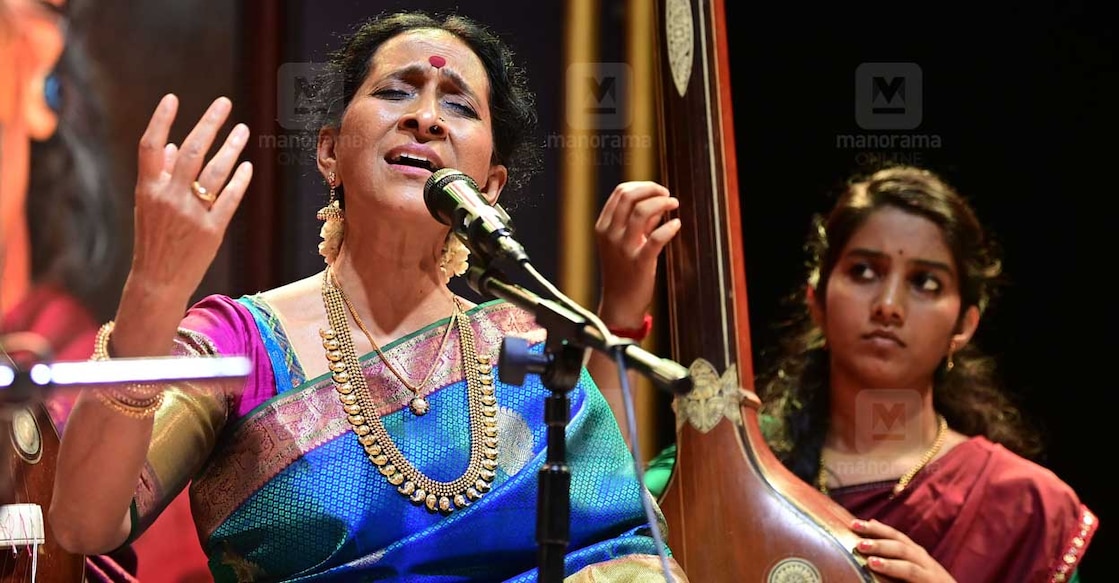How Bombay shaped Jayashri’s personality

Mail This Article
Celebrated Carnatic vocalist and singer Bombay Jayashri, who is recovering after a recent health scare, shares an inseparable bond with the city of Bombay even though she was born in Kolkata and later settled in Chennai, where she has spent around 35 years of her life.
Jayashri’s association with Bombay lasted only for a few years during her teenage years, but she has never shed the reference to the metropolis from her name and has always been enthusiastic about retaining that identity. Even when Bombay itself came to be known as Mumbai decades ago, Jayashri continues to use Bombay with her name.
Why is Jayashri so keen about continuing her connection with Bombay? The singer herself provided the answer during various interviews she gave over the years. “Bombay city has a big role in shaping my personality,” she said.
In 1987, S Jayashri had reached Chennai from Bombay to perform at the Margazhi Music Festival and noticing her supreme talents, reviewers enquired where she came from. “Bombay,” replied Jayashri.
In all the reviews published in newspapers the next day, the name of the singer who gave an excellent performance at the Margazhi Festival was given as ‘Bombay S Jayashri’. Initially, Jayashri did not like that name. However, now, it has become dear to her.
Incidentally, Madras too changed its name to Chennai, but the Madras Music Academy still sticks to the old name and Bombay Jayashri is this year’s winner of the top award of the Academy, Sangeetha Kalanidhi Puraskaram.
Jayashri was selected for the biggest award in Carnatic music only by the age of 60 years. However, she earned a permanent place in the hearts of music lovers much earlier, with her stage recitals, music albums and film songs.
Social commitments too
When she suffered a brain haemorrhage in London within a week of the announcement of the Sangeetha Kalanidhi Awards, those who prayed for her recovery, included not only music lovers but also numerous orphaned children, autistic kids, cancer patients and abandoned elders. For these people in distress, Bombay Jayashri is a caring angel and source of succor.
Jayashri became involved with activities supporting distressed people after an incident in Dubai. After a concert in the city, a child with autism approached her backstage. The child pointed out each of the errors committed by the singer during the programme. Initially, Jayashri did not openly approve the child’s statements, but when she heard the recording of the event later, the singer realised her mistakes.
Later, another autistic child in Bengaluru, the erstwhile Bangalore, who was aged a mere four years also left Jayashri speechless. This child could easily render a ‘raga’ which was tough even for singers trained for 10-15 years.
These incidents made Jayashri recognise the special talents of autistic kids and she became involved in activities for their welfare. She soon set up a trust named ‘Hitam’ and travelled to various places to sing for autistic children.
Jayashri often said that art was the ideal instrument to create a better human being and provide happiness and peace. “There is music in every person’s life. It is like a friend. Music accompanies you during birth and death. On many occasions, we don’t sense its presence,” she said.
Jayashri also said that all autistic kids need not be proficient in music. “Some among them would be interested in another field. But these children never fail to amaze me,” she said.
Love for lullabies
Jayashri’s activities so far include music therapy and care, for which she spends much time. Her Hitam Trust conducts music classes at a school at Manjakudi in Tamil Nadu. Here Jayashri conducts classes for a few days every year. In fact, the kids of Manjakudi joined Jayashri in her album of lullabies titled ‘Moon child’ and the uniqueness of the song ‘Thankamony rathiname thalayadum chithirame’ was the children’s voice.
Another lullaby included in the album, ‘Chakkaramuthe vavurangu’ was in Malayalam and written by Jiji Biju. Earlier, Jayashri had presented ‘Vatsalyam’, another album with traditional lullabies in various Indian languages.
Jayashri had also admitted that lullabies were a weakness for her. Its reason was her inability to sing such songs for her own children, she said.
Her fondness for lullabies later earned Jayashri an Oscar nomination. The song ‘Kanne Kanmaniye’ in Ang Li’s ‘Life of Pi’ was written and set to music by Jayashri herself. The recording of the song, which had six lines, was completed in a week due to Ang Li’s stress on perfectionism, recalled Jayashri. Li told Jayashri that kids should not only sleep when hearing a lullaby but also have to feel secure. No wonder, the song earned praise from around the world.
Jayashri cooperates with several organisations working for social welfare. She is also interested in taking Indian classical music to the youth and is associated with SPIC-MACAY for around four decades.
Jayashri never fails to credit Mumbai city for her social welfare activities
“Mumbai taught me to look beyond music and to the wide world,” she said on multiple occasions.
In Mumbai, she met different people and saw their varied lives. She got acquainted with diverse cultures during her studies at St Antony’s School, Chembur, and R A Podar College. Her participation in amateur dramas in college helped Jayashri learn the art of taking the stage. Moreover, the days in Bombay enabled Jayashri to familiarize herself with Hindustani, western, folk, pop, rap and metal music. In the metropolis, she sang jingles for commercials and gained a better command over Hindi than English and Tamil, along with overcoming stage fright during recordings.
After living in Bombay, Jayashri never felt a lack of confidence and always maintains a connection to that city through her name.
Jayashri took ill last week while on a tour of the United Kingdom. After a successful surgery, she is reportedly recovering well.

